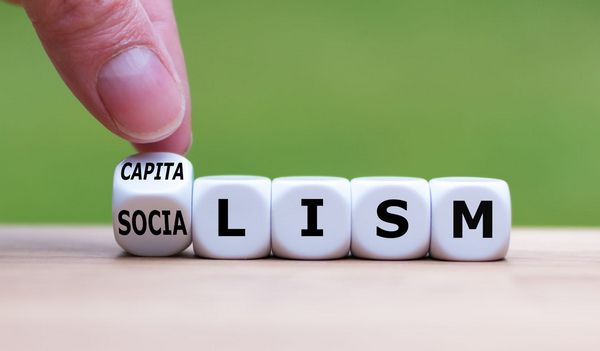What is socialism?

At the beginning of the election campaign Starmer was reported as saying that he considered himself a socialist. According to Chris Mason, the BBC’s Political Editor, ‘Starmer told me today he sees himself as a socialist. For those scared of that label, he said he saw it as putting “the country at the service of working people”’ (tinyurl.com/6cfvzach 27 May 18.04).
Few can have believed that Starmer is in any sense a socialist, but it at least provoked the media into talking about ‘socialism’. In an ‘explainer’ article, the Guardian (28 May) even asked ‘What is Socialism?’ Their answer reflected dictionary definitions, which describe how a word is used rather than how it should be:
‘Like many political philosophies it means different things to different people. But broadly socialists believe all human beings are of equal worth and that society should be organised to reflect that. Fairness, equality, justice and the common good are the foundations of socialism. The wealth created by humans should be used to benefit everyone. Some socialists believe that key industries and sectors, such as utilities, transport and housing, should be owned by the state and run in the public interest rather than for private profit. Other socialists believe that all industries and sectors should be run this way’ (tinyurl.com/t4yrd4j5 ).
We have inherited a definition of socialism which we consider to be both logically and historically correct — a system of society based on the common ownership and democratic control of the means of living by and in the interest of the whole community. But we can go along with some of the things the Guardian says. For instance, that ‘all human beings are of equal worth and that society should be organised to reflect that’ and ‘that wealth created by humans should be used to benefit everyone’.
On the other hand, describing the foundation of socialism as fairness, equality, justice and the common good doesn’t tell us anything as different people have different opinions as to what is fair, just or in the common interest. Supporters of capitalism could — and in fact do — claim this for capitalism.
The question is: on what basis would society have to be organised to ensure everybody is of equal worth and wealth used to benefit everyone? In our view it could only be on the basis of the means of living (land, industry, transport, communications, etc) being the common property of the whole community. In other words, belonging to everybody but this is the same as belonging to nobody. A socialist society is one where no individual or group of individuals has ownership or controlling rights, in law or in fact, over the resources to produce what society needs to survive as this puts them in a privileged position vis-à-vis the rest of society.
A classless society means that everybody stands in the same relationship to the means of living as everybody else, each having the same opportunity to have a say in how society is run, through democratic procedures of one kind or another. Without the means of living being commonly owned and democratically controlled, the wealth that humans create cannot be used to benefit everyone. Only once freed from the constraints of sectional ownership and the economic forces set in motion when there is production for the market, can society be in a position to do this.
The Guardian (and dictionaries) attempt to grasp the idea of common ownership, which is indeed the basis of socialism, by equating this with ‘public/government ownership’ defined as ownership by the state. But the state is not the same as the community. The state is an institution standing above society controlled by and for a section only of the members of society. Under capitalism it is controlled by that section that owns and controls the means of living. The ‘public interest’ is their interest and ‘public ownership’ is ownership by them as a class. What government ownership amounts to is state capitalism.
Ever since our foundation in 1904 we have consistently argued that government ownership is not socialism. See, for instance, ‘Nationalisation not Socialism’, March 1908 and ‘Evolution and State Capitalism’, April 1910.
That state capitalism is the same as socialism is the most common misunderstanding as to what socialism means. It can even be described as the illusion of the epoch. It is only on the basis of this mistake that the Labour Party (at one time, a long time ago) and Russia when it was the USSR could be described as socialist.
What Starmer thought socialism is was not clear, but he did mention to Chris Mason that it meant ‘the country in the service of working people’. That’s not socialism either. In fact it’s how the Conservatives might describe conservatism and the Lib Dems liberalism. But at least it is something that a Starmer Labour government can be judged by.
The trouble for him is that a country with a capitalist economy simply cannot be made to serve the interest of ‘working people’, or the social class made up of people who, through being excluded from ownership and control of the means of living, are forced by economic necessity to sell their working skills to some employer. A society based on minority ownership and production for profit can never be made to work in their interest as making profits for capitalist enterprises ahead of satisfying people’s needs is built into it. Hence the problems that the working class face. As these arise from capitalism, they cannot be solved without getting rid of capitalism.
We confidently predict, therefore, that Starmer will fail in his endeavour to make capitalism serve the working class. Socialism, properly understood as the common ownership and democratic control of the means of living, is the only framework in which people can be social equals and production re-oriented to serve people’s needs.
ADAM BUICK
